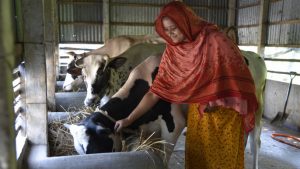The protectionist support policies of other countries cost Australian agriculture 11 cents for every litre of milk and $1.03 for every kilogram of red meat our farmers produced.
A report released this week by AgriFutures, International agricultural subsidies and their impact on Australian agriculture, revealed the import protections and subsidies enjoyed by farmers overseas lowered Australia’s net farm incomes by 15 per cent and reduced farm exports by 29pc, wiping $10.42 billion from exports.
Over the past 30 years, import tariffs have come down and, even though domestic subsidies have risen, the overall rate of assistance in the OECD has fallen from 59 to 23pc.
In 2014, the EU, Japan, China and Korea accounted for about three-quarters of the effects impact on Australia.
The big one to watch is China. At $US202 billion, China’s agricultural assistance amounted to almost as much as the $US212b spent in all OECD member countries, and more than twice as much as the $86b received by EU farmers.
Japan is next at US$39b, then the USA with US$36b, and Indonesia with US$35b in farmer support.
The good news was that, thanks to free trade agreements struck with Japan, China and Korea, import barriers had been phased down preferentially for Australia from 2015.
Continued efforts to reduce trade barriers and multilateral trade reform via the World Trade Organisation were recommended.
The current trade negotiations with the EU and prospects of an FTA with the UK once it completes Brexit were especially important.
Subsidies and trade barriers aside, report authors Kym Anderson and Ernesto Valenzuela suggested the competitiveness of Australian agriculture was weakening as low investment in research and development drove sluggish productivity growth for agricultural research.
They called for a review of farmer levies, government co-payments and institutional arrangements.
“To fully exploit the potential for farmers to take up carbon sequestration prospects, which appear to be especially high for Australia, a large boost in appropriately targeted agricultural RD&E is likely to be needed,” the report said.
“This should be a key part of the assessments of needs to incentivise farmers to supply more environmental services, and to expand RD&E investments.”
The report also recommended considering payments for environmental services provided by farmers and whether a natural capital market can and should be developed in Australia.
Industry support
The red meat and dairy industries have swung behind the recommendations of the AgriFutures report.
Red Meat Advisory Council (RMAC) chief executive Anna Neelagma said it illustrated the importance of key trade agreements to the industry and the need to lift productivity.
“Recognising Australia’s growing problem in commercialising or adopting our research, through Red Meat 2030, we committed to a substantial increase in adoption rates by doubling the percentage of project funding for extension,” she said.
“This means dedicating a 5-10 per cent of R&D project budgets in order to connect industry directly with industry-led research.”
It also supported further investment in sustainability and the development of the natural capital market and remunerating land managers for ecoservices.
Australian Dairy Farmers policy and strategy director Craig Hough said the peak dairy body supported every single one of the AgriFuture report’s recommendations – including potentially increasing producer levies for R&D – and went further.
“Aside from the tariffs and supports this report discusses, there are other barriers that need attention, like product and plant registration certificates, country of origin labelling, border clearance procedures, which can be excessive,” he said.
“Competitors often use them as leverage.”













